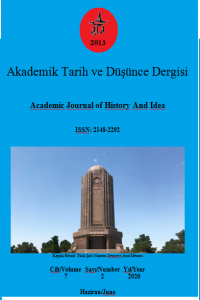Tanzimat’ın Taşraya Sosyo-Kültürel ve Siyasi Yansımasına Bir Örnek: Sivas Sancağı’nda Nümayiş
Osmanlı döneminde eşraf tarafından halkın sevgi ve nefret duygularının yönlendirildiği, zaman zaman da istismar edildiği zamanlar yaşanmıştır. Bu suiistimal bazen âyanlar bazen de yerel yöneticiler veya halkın ileri gelenleri tarafından yapılmıştır. 1818 yılında Sivas âyanı halkı zahiren valinin haksızlığı ve dolayısıyla ona duyulan nefret duygusunu istismar ederek kendi emelleri doğrultusunda isyan ettirmişti. 1844 yılında Tanzimat’ın merkezden taşraya doğru etkisini hissettirdiği bir dönemde ise bu sefer eşrafın âyanların yerine geçerek halkın valilerine karşı sevgisini kendi çıkarları için kullanmaya çalıştıklarını ve halkın tüm kesimlerini harekete geçirdiklerini görmekteyiz. Sivas sancağında 26 yıl arayla meydana gelen bu toplumsal hadiselerde halkın tepkilerinde görülen bazı değişikliklerde Tanzimat Fermanı’nın etkisini müşahede edebiliyoruz. Toplumun tüm katmanlarının destek vermesi yanında olayların sonunda elebaşların cezalandırılmaları da her iki hadisenin müşterek noktalarıdır. Çalışmamızda daha önce kullanılmamış belgelere de yer verilerek birinci elden kaynaklardan istifade edilmiştir. Mahalli tarihin karanlıkta kalan bir olayını gün yüzüne çıkaran bu çalışma, zamanla halkın tepkilerindeki değişimi ve onları yönlendiren eşraftaki değişiklikleri de görmemize imkân sağlaması açısından da önemlidir.
An Example of the Socio-Cultural and Political Reflection of Reformation in the Outback: Demonstration in Sivas Province
In the Ottoman Empire, the city residents’ feelings of love and hate were guided by the power centers of the time and were exploited from time to time. The abuse in question was sometimes conducted by the public, sometimes by local administrators or by the influential figures of the time. In 1818, the insurgents who apparently exploited the injustice of the governor and hence the sense of hatred at Sivas province, led to the rebellion of the public in line with her own ambitions. In 1844, at a time when Reformation made its effects from the center to the provinces, it was seen that this time, the some influential figures who used the love of the governor of the people, replaced the insurgents and agitated all the sections of the society to protect their own interests. We can observe, after 26 years of interval in Sivas province, the effect of the Restoration Decree on the change in the reactions of the people. In addition to receiving support from all the layers of the society in both events, the fact that the leaders are punished as a result of the events are the common points of the two events. In the present study, we have benefited from firsthand sources by including documents that have not been used in any other studies. This study, which reveals a dark event of the local history, is also important in terms of enabling us to see the change in the reactions of the people over time and the notification of the elites who guide them.
___
- TÜRKMEN, Z. , “Müşir”, Türkiye Diyanet Vakfı İslâm Ansiklopedisi,32: 160-161, İstanbul, TDV Yayınları, 2006.
ULUDAĞ, S. , “Hangah”, Türkiye Diyanet Vakfı İslâm Ansiklopedisi, 16: 42-43, İstanbul, TDV Yayınları, 1997.
UNAN, F. , “Mevleviyet”, Türkiye Diyanet Vakfı İslâm Ansiklopedisi, 29:467-468, Ankara: TDV Yayınları, 2004, 467-468.
UYGUNUÇARLAR, E. Erhan, Kenanzâdeler, İstanbul, Kitabevi Yayınları, 2019.
YILDIZ, F. , “Sivas Vilayet Yönetimi ve Valileri (1800-1850)”, Yüksek Lisans Tezi, Cumhuriyet Üniversitesi, 2011.
YILMAZ, Ö. , “Tanzimat Döneminde Osmanlı Taşra İdare Meclisleri (1840-1871”, Journal Of History Studies, sy. 6/6 (2014): 253-277.
